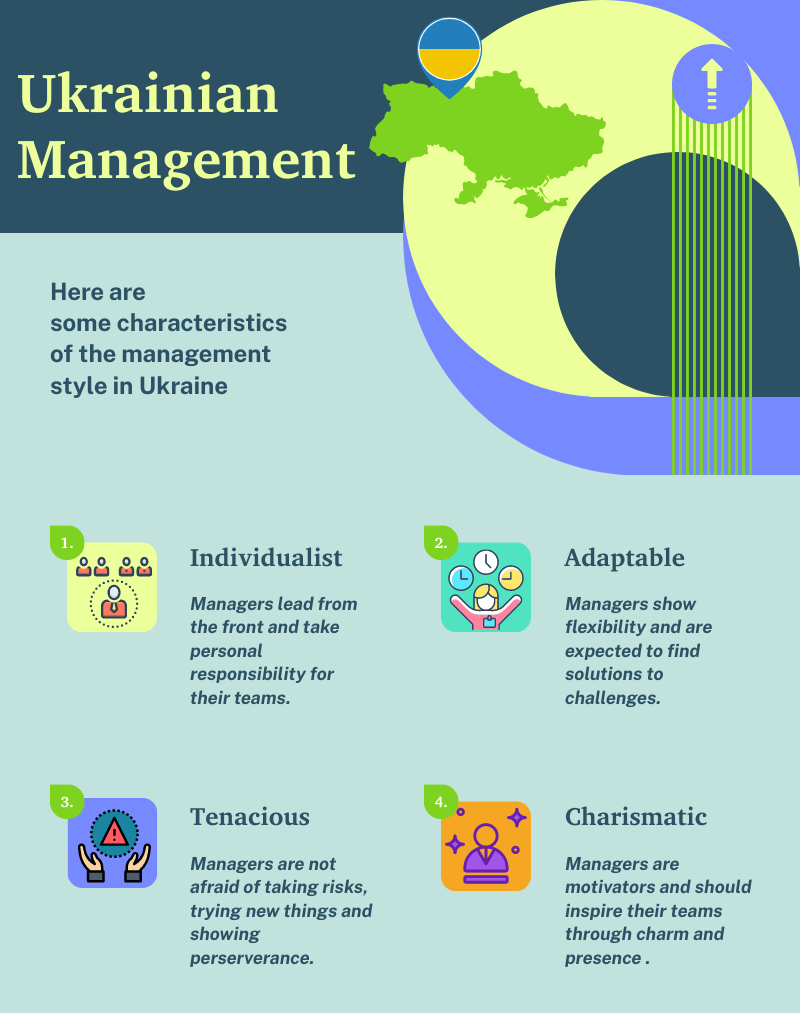
Cross Cultural Management Guide for Ukraine
The guidance offered below is for managers who want to learn more about the management style and business culture of Ukraine.
It provides some useful information for managers who are relocating to the country for employment as well as those who may have Ukrainian employees in their global or multicultural teams.
Topics include:
- Hierarchy
- Leadership style
- Time and scheduling
- Communication style
- Negotiation
Management in Ukraine
The business culture in Ukraine is formal. In other words, you need to pay close attention to hierarchy, status and following protocol.
- In business, it is important to be aware of your colleagues’ positions and rank so that you treat them with the appropriate deference.
- Be aware of generational differences in the country as this has a large role in the management style.
- Ukrainian managers tend to be strong individualists; this means they aren't always natural team players.
The Role of a Manager
Successful management is more likely with some knowledge and understanding of Ukraine’s history. Management in countries of the former Soviet Union is a complex, constantly evolving state of affairs, each country moving towards a market economy (with its’ accompanying protocols) at a different pace.
- The transition to a free-market economy has brought about remarkable, but not wholesale changes in the business culture.
- Generally, among the older generation, you will find deference to authority, coupled with a sense of loyalty and a detached attitude toward meeting the objectives and goals of the company.
- Among younger workers, however, you’ll find an eagerness to explore the new opportunities that the market has to offer. They are eager to try different company cultures, seeking new challenges that will strengthen their value as executives quickly.
Approach to Change
Ukraine has a medium tolerance for change and risk.
- Most Ukrainian managers developed their skills while the business environment was transforming itself: in order to survive they had to be very flexible, able to adapt rapidly to frequently changing situations, be tenacious, and able to take risks.
- The fear of exposure, and the potential embarrassment that may accompany failure, bring about an aversion to risk and because of this attitude; cultural sensitivity is going to be required.
Approach to Time and Priorities
Ukraine is a moderate time culture and typically there may be some flexibility to strict adherence to schedules and deadlines.
- When working with employees from Ukraine, it is advisable to reinforce the importance of the agreed-upon deadlines and how that may affect the rest of the organization.
- Global working means that some managers may have a greater appreciation of the need to enforce timescales and as such, agreed deadlines are more likely to be met.
Decision Making
Most businesses retain a hierarchical structure where employees are expected to defer to anyone in a position of authority.
- Ukrainians have great respect for age and status, which is denoted by position or wealth.
- The management style may seem dictatorial or autocratic by Western standards.
- Managers expect their subordinates to follow established procedures without question.
- Since the educational system promoted rote learning for many years, employees often lack problem-solving skills.
- Subordinates are often hesitant to question a manager’s instructions.
- Many older managers prefer to make no decision rather than risk making an incorrect decision.
Boss or Team Player?
In post-communist countries, there is a tradition of teamwork inherited from the communal aspects of the previous era where groups and work units commonly met to discuss ideas and create plans. However, those plans seldom resulted in implementation or results, leading to apathy and cynicism among the workers.
- Today the after-effects are still evident among much of the older generation resulting in a lack of drive and energy.
- However, there is vibrancy among the younger generation, who seem to be eager to tackle many of the challenges and take the opportunities presented.
- They will participate in teams and share ideas, but cultural sensitivity will be needed and it should be understood that they will need to be coached in the process.
- Efforts to promote Western-style teambuilding may work well during training; however, they often may not suit the realities of local culture and do not translate easily into daily practice.
Communication and Negotiation Styles
Ukrainians prefer to deal with those they trust; therefore they spend a great deal of time developing the relationship.
- Ukrainians are relatively indirect communicators and are careful to remain polite throughout discussions.
- They tend to deliver information in a sensitive manner that understates their point or opinion.
- Most negotiations involve a team, although the most senior Ukrainian is generally the spokesperson.
- Ukrainians can be tough negotiators. If you let the other side know that you have a time deadline, they will delay even further in an attempt to coerce you into making concessions.
- Some senior people may lose their temper, walk out of the meeting, or threaten to terminate the relationship in an attempt to coerce you to change your position.

Get Expert Support
Why not learn more by taking a two-hour live webinar, customised to meet your unique needs, with one of our Ukraine experts?
They can help you navigate the business culture with ease.

 +44 0330 027 0207 or +1 (818) 532-6908
+44 0330 027 0207 or +1 (818) 532-6908
